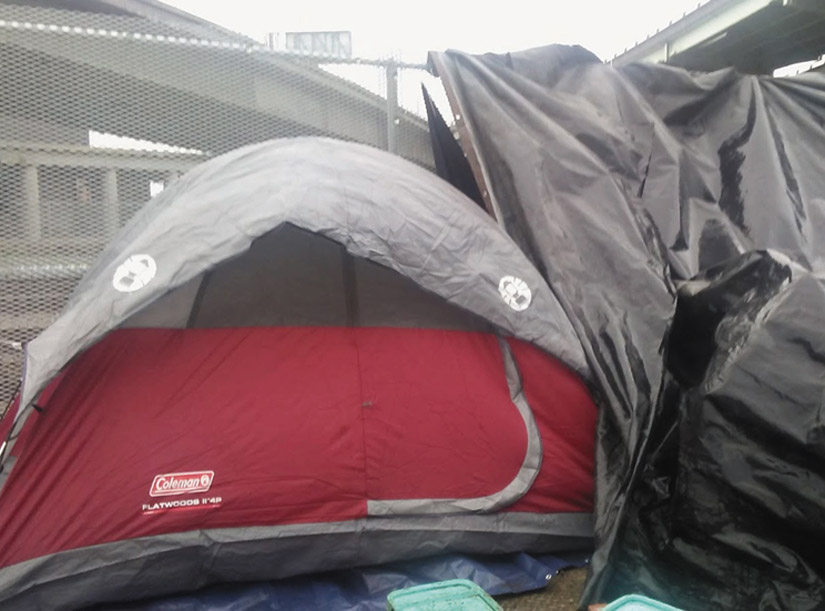by Wanda Sabir
The structure, if you can call it that, is made from heavy plastic tied to a fence facing a field where freight and passenger trains speed by more than a few times a day.
I know that Miss Raynel lives here. I was by last week when it was a lot dryer.
When Delene, Kwalin and I look inside the open structure, two sets of pretty eyes peak back at us. Two girls are under a blanket beneath the heavy plastic structure.
There’s nothing behind them but fencing. I see a wild dog running in the field. I wonder if he’s lost or trapped and how he got in there.
We can’t tell how old the girls are. They just look young, really young. We learn that they are Miss Raynel’s nieces, visiting with her for the weekend.
It’s not safe. Anyone can walk up on them. She’s fortified the perimeter with shopping carts and bags full of trash, but these could easily be removed.
At the structure’s core are piles of recyclable items — Miss Raynel’s ready cash when she needs it. I suggest RJ and I hire a truck to help her get the items to a recycling place, and that she recycle everything and save the money. But lying in a place like this, she says, they are as safe as money in the bank, her Certificates of Deposit.
Different crop, same methods
Miss Raynel knows the value of the items. She made 51 dollars last week. But often, when she brings them to the recycling center, she’s unable to see the scale. She and the others have to settle for a fraction of their haul’s worth. Her story reminds me of the days when the cash crop was cotton, not cans. Different crop, same methods.
Just as slavery was replaced with sharecropping when the North and South united, West Oakland is about to go through some big changes. The recycling plant is shutting its doors soon to make way for condos. Where will discarded people with discards, toting a devalued cash crop, cash in then?
Seeing children sleeping outdoors, of course, stuns all of us. Miss Raynel’s neighbor confirms that the teenagers are here only on weekends. Wow! They must really love their Auntie Raynel to hang out in a homeless encampment in wet weather. This female-headed family’s lives are open to the elements, both natural and unnatural.
I am really happy that we catch Miss Raynel on a day when her situation allows us to gift her a tent. Maybe it’s the tears she sees in Lisa’s eyes, the compassion in RJ’s heart or what we saw when we looked into the shelter. Just a week earlier, she had told me that for two years she hadn’t wanted a tent, because a tent represents the permanence she’s resisting.
RJ and Miss Raynel start organizing her things. Surrounded by debris for so long, just the idea of order probably overwhelms her. But RJ goes inside the tarp enclosure and helps her sift through what is precious and what is trash. There are bugs and vermin and RJ is working without gloves (not something I recommend). They remove recyclable items and trash to make space.

All that is left of a life
Miss Raynel has a lot under her awning; years of possessions she can’t let go of. I understand. These items are all that is left of a life she lives in her memories, a time when there was shelter, privacy and perhaps safety.
Before we can set about assembling the tent, we have to level the ground. RJ digs up the dirt, then he and Lisa place the wood pallets.
In some way, the wet weather makes fitting the pieces together easier. It’s like a jigsaw puzzle.
We then put down tarps which blow away as we wrestle with the poles. The box says we can assemble this tent in ten minutes. It takes us about an hour and there’s still more to do.
A crowded tour bus drives by and stops so tourists can take photos. They don’t get off the bus or ask permission to take the photos. Then they leave with waves and smiles.
Miss Raynel is really disgusted. She says she doesn’t want her family to know she’s on the streets.
All day, we’re splashed by speeding cars and nearly run off the road by others who see us working, yet disregard us.
Several hours later, RJ and Lisa have placed wooden platforms where the water is worst: at the front and rear entrances. No longer does she have to wade in water to get in and out of her dwelling.
We lift the heavy black plastic so the settled rainwater can run off. RJ cuts the excess plastic off and places another piece at the front of the shelter.
When we finish our work, we are all pretty dirty, wet and hungry. It has been a long day working from 7:30 a.m. to 5 p.m. It’s not a fatigue that grabs you all at once; it sort of creeps up on you. When I get home, I just step out of my clothes at the door.
After I shower, I lie down and try to empty my mind, close my eyes. All I see are the brothers and sisters left behind. The following morning, when I wake up, the pile of clothes is right where I left it.
